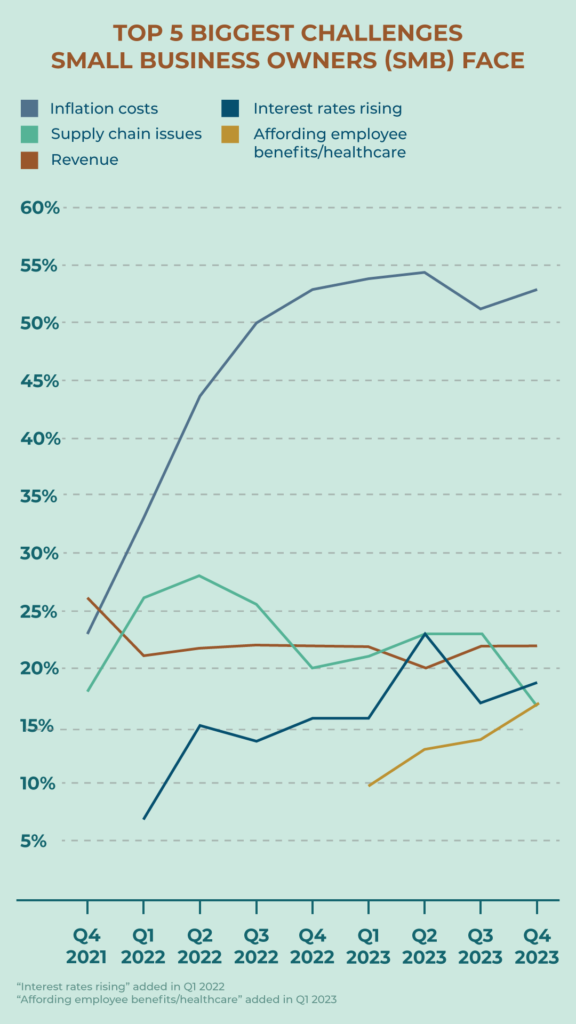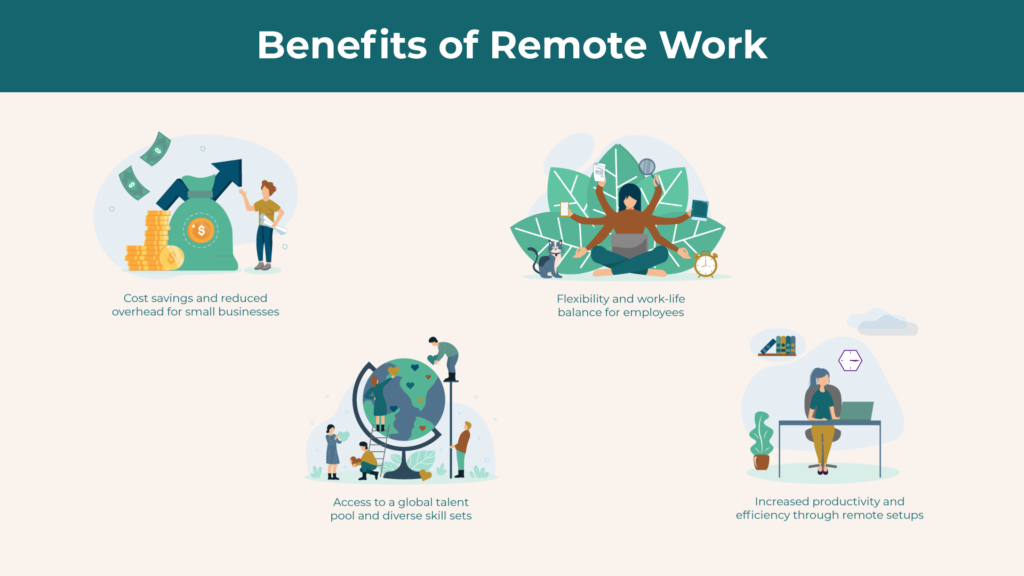
A growing concern among business owners is affording employee healthcare and benefits. Inflation has remained the top concern for small businesses for the last two years, with 53% identifying it as their biggest challenge, according to a Q4 2023 from the US. Chamber of Commerce. This is the sixth consecutive quarter where 50% or more have cited inflation as their top concern. Services sector businesses are more likely to face inflation than manufacturing or professional services. Other challenges include revenue (22%), rising interest rates (19%), and supply chain issues (17%), which are less significant than in Q2 2022.

Moreover, the Q4 2023 report emphasizes other major risks.
In 2023, 54% of these actively hiring companies say they have difficulty finding candidates with the right talent and necessary job experience.
Here are other growing concerns of enterprises when looking for new talent.
- Most small businesses face a labor shortage in their area.
- Increasing numbers of small businesses actively seek new workers.
- Most find it challenging to meet employee salary expectations, impacting their ability to retain talent.
- Adopting flexible and remote work emerges as a strategy to attract employees for many businesses.
Small businesses in the professional services sector and those owned by Gen-Zers or millennials are particularly likely to say they will offer a hybrid or remote work environment to attract talent in the coming year.
In this article, we will explore how remote work can transform your small business and enhance your performance, profitability, and potential. We will also introduce you to iSWerk, a remote staffing company that can help you find and hire the best remote workers for your small business needs.
The Rise of Remote Work
Working remotely has become more than a trend since the COVID-19 pandemic. It has transformed the work dynamics globally and is here to stay. Experts expect 22% of US workers to work remotely by 2025, changing workplace standards.
Below are the top industries that adopted the remote work model, whether it’s their core or non-core functions.
- Computer and IT (Information Technology)
- Marketing
- Accounting and Finance
- Project Management
- Medical and Health
- HR (Human Resources) and Recruiting
- Customer Service
Advantages of Remote Work for Small Businesses
Both employers and employees can gain several perks from working remotely. Some benefits of remote work include cost savings, flexibility, productivity, and diversity. But how can small businesses leverage remote work to grow and thrive in the competitive market?
We’ll talk about some of the perks of remote work for your company and how they can help you reach your goals.

Cost savings and reduced overhead for small businesses
By allowing employees to work from home or anywhere else, small firms can save on expenses such as rent, utilities, equipment, travel, and office supplies. A FlexJobs survey found that remote workers save firms $11,000 per year per employee. This can significantly improve profitability and cash flow for small enterprises with limited resources. With limited budget and resources, enterprises can make a significant difference in their profitability and cash flow.
Access to a global talent pool and diverse skill sets
Hiring remote workers helps small businesses expand their reach and find the best candidates for their needs, regardless of their location, time zone, or availability. Remote work also allows companies to tap into a variety of skill sets and expertise, such as language, culture, creativity, and innovation. This helps businesses enhance their products, services, and cater to different markets and audiences.
Flexibility and work-life balance for employees
Small business staff who work from home have more freedom and a better work-life balance. Remote workers can choose their own schedules, work environments, and work styles, according to their preferences and needs. This could improve work-life balance and minimize stress and burnout. A survey by Owl Labs found that 71% of remote workers are happy with their jobs, compared to 55% of on-site workers.
Increased productivity and efficiency through remote setups
Finally, remote work can also boost the productivity and efficiency of small businesses and their employees. Remote workers can avoid the distractions and interruptions of the office, and focus on their tasks and goals. Remote work also eliminates the time and energy wasted on commuting, and allows employees to work when they are most productive and motivated. A study by Airtasker found that remote workers work an average of 1.4 more days per month than their office counterparts, and are more likely to take breaks and exercise regularly.
Remote Work Roles Ideal for Small Businesses
Now that we have discussed the benefits of remote work, we will explore some of the most common and in-demand remote jobs for small businesses, and how these roles can help companies achieve their goals and objectives.

Virtual Assistants and Administrative Support
Virtual assistants offer versatile remote work roles, performing tasks like data entry, scheduling, email management, research, booking, and customer service, helping businesses save time and focus on core activities.
Content Creation and Digital Marketing
Companies can leverage remote work roles in content creation and digital marketing to generate engaging content, boost brand awareness, increase traffic, generate and convert leads.
IT Support and Tech Services
IT support and tech services are another common and in-demand remote work roles for small businesses. They maintain and troubleshoot IT systems and devices such as computers, networks, software, hardware, and security. In addition, these professionals prevent and resolve IT issues and ensure the smooth and efficient operation of their business.
Finance, Accounting, and Bookkeeping
Businesses often require remote finance, accounting, and bookkeeping roles to manage financial operations such as budgeting, invoicing, tax filing, payroll, reporting and auditing. The remote staff could optimize costs, comply with regulations and make informed decisions.
Sales and Customer Service
Sales and customer service are crucial remote work roles for small businesses, enhancing customer attraction, retention, and revenue through effective communication and product offerings.
Project Management and Coordination
Project management and coordination are crucial remote work roles for ensuring timely, budget-friendly and quality project completion, improving performance, efficiency, and collaboration.
The Philippines for Your Remote Workforce

The Philippines is one of the best countries to source remote workers for small businesses. The Philippines has a large and diverse pool of remote workers with various skills, qualifications and experience. The Philippines is ideal for offshoring businesses, seeking remote talent due to its English proficiency, cultural compatibility, cost-effectiveness and time zone flexibility.
If you are looking for remote workers from the Philippines for your small business, you can explore remote work opportunities through iSWerk.
Explore Remote Work Opportunities through iSWerk

iSWerk is a remote staffing company based in the Philippines that provides a large pool of competent and experienced remote workers. They ensure worker quality through screening, testing and quality assurance.
iSWerk also handles the recruiting, hiring and payroll processes which saves time and money. They offer businesses an opportunity to select people based on their talents, experience, availability and rates.
They also provide training, supervision and quality control. iSWerk can assist small firms in gaining access to remote work options, hence improving performance, profitability and potential. They also help overcome challenges and risks, such as communication, collaboration, culture, engagement, security and compliance.
Final Thoughts
Due to several benefits of remote work, more and more companies are embracing this innovative strategy. It provides cost savings, flexibility, productivity, variety, access to a global talent pool, and various skill sets. However, small businesses need to understand the best remote work roles and implement them successfully.
